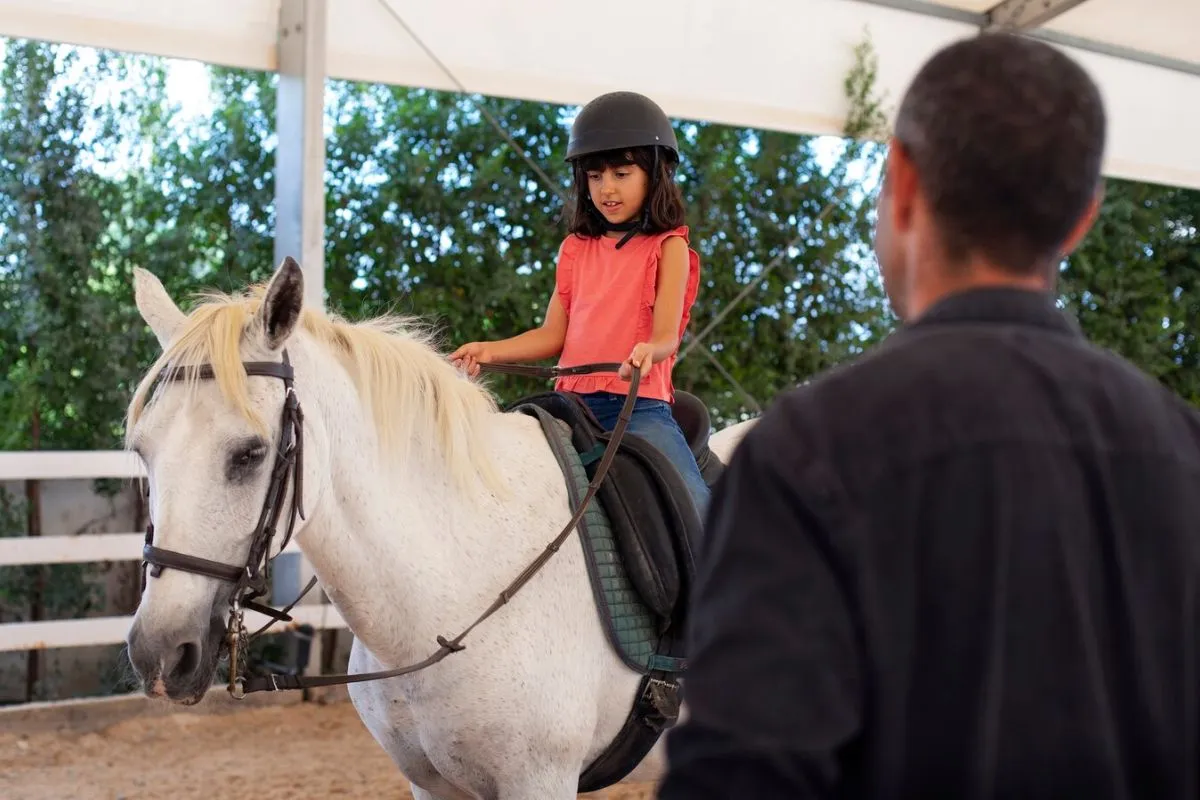Equine-Facilitated Psychotherapy is a form of emotional treatment that leverages the connection between patients and horses. This therapeutic approach is increasingly recognized for its benefits in mental health.
Patients struggling with psychiatric disorders often find solace in horse therapy. The unique bond formed with these majestic animals can lead to remarkable improvements in well-being.
Let’s explore the profound impact of equine therapy, its mechanisms, and its application in contemporary mental health treatment.
The Basics of Equine-Facilitated Psychotherapy
Equine-Facilitated Psychotherapy involves structured activities with horses designed to promote emotional and psychological healing. The therapy may include riding, grooming, and ground activities.
Facilitators, usually licensed therapists or mental health professionals, guide patients through interactions with horses. The presence and behavior of the horse provide immediate, non-verbal feedback.
This feedback helps patients gain insights into their emotions, behaviors, and relational patterns. The therapy is particularly beneficial for those who have difficulty expressing themselves verbally.
Emotional Treatment through Connection
Connection is at the heart of Equine-Facilitated Psychotherapy. Horses, being naturally intuitive creatures, respond to human emotions extremely well. They can mirror the emotional states of patients.
This mirroring aspect makes horses excellent co-therapists in emotional treatment. For patients, this provides a rare opportunity to observe and understand their emotional landscape from an external perspective.
Furthermore, building trust with a horse can enhance relational skills, preparing patients for healthier human relationships. This emotional mirroring and trust-building have solid bases in therapeutic outcomes.
Practical Applications in Mental Health
The use of horse therapy extends to various psychiatric disorders. Conditions such as PTSD, depression, anxiety, and autism have shown responsive improvements with equine therapy.
Specific methodologies, like Natural Lifemanship, delve into trauma-focused equine-assisted psychotherapy. These methods adhere to trauma-informed care, making them suitable for deeply affected individuals.
Horses’ non-judgmental nature provides a refreshing contrast to traditional therapeutic environments. Patients often feel a unique sense of acceptance and safety, crucial for their healing journey.
Benefits of Equine Therapy
The benefits of Equine-Facilitated Psychotherapy are diverse. One of the primary benefits is the development of emotional regulation. Interacting with horses requires a calm demeanor, encouraging patients to manage their emotional responses.
Additionally, the physical activity involved in horse therapy contributes to overall well-being. Physical health improvements naturally enhance mental health, creating a holistic therapeutic environment.
Self-esteem and confidence also significantly increase. Successfully engaging in activities like riding or grooming a horse instills a sense of accomplishment and empowerment.
Specific Techniques in Equine Therapy
Equine therapy employs several specific techniques to maximize therapeutic outcomes. Groundwork, including leading and lunging horses, emphasizes non-verbal communication and body language awareness.
These techniques are tailored to each patient’s needs. For example, grooming activities can be soothing and provide a meditative rhythm that aids in reducing anxiety.
Mounted activities, where patients ride horses, focus on building self-control, balance, and coordination. The sense of mobility and freedom enhances mental health through physical sensation.
Role of the Therapist
The therapist plays a critical role in Equine-Facilitated Psychotherapy. They must be skilled in both mental health and equine behavior, ensuring safe and effective sessions.
Therapists interpret horse-patient interactions, providing insights and guidance. Their role includes setting therapeutic goals, monitoring progress, and adjusting activities as needed.
This dual expertise ensures that both the patient and the horse remain safe, engaged, and progressing towards emotional growth and healing.
Success Stories
Many success stories highlight the transformative power of equine therapy. For instance, veterans with PTSD have found relief and a new sense of purpose through equine-facilitated sessions.
Children with autism have demonstrated improved social skills and emotional regulation. The non-verbal communication inherent in horse therapy makes it particularly effective for those on the spectrum.
Even corporate stress management programs have incorporated horse therapy, helping employees develop leadership skills and stress resilience in a unique and engaging manner.
Challenges and Considerations
While Equine-Facilitated Psychotherapy offers numerous benefits, it also comes with challenges. One significant consideration is accessibility, as not all patients have access to facilities offering horse therapy.
Geographic limitations can make it difficult for some individuals to participate in these programs. Efforts to expand the reach of equine therapy through mobile units or satellite programs could help address this issue.
Additionally, the costs associated with maintaining horses and appropriate facilities can be high, which may limit widespread availability. These financial burdens include feeding, veterinary care, and facility maintenance.
The high cost of therapy sessions may also be a barrier for many families. Increased funding and support from health organizations could help make this therapy more accessible.
Another challenge is ensuring safety, as working with large animals requires strict adherence to safety protocols, both for the physical and emotional wellbeing of patients. Proper training for therapists and staff is essential to minimize risks.
Establishing comprehensive safety guidelines and regular inspections of facilities can enhance safety standards. Ensuring a secure environment helps build trust and effectiveness in the therapeutic process.
Overcoming Barriers
To make Equine-Facilitated Psychotherapy more accessible, some organizations offer scholarships or sliding scale fees. Community partnerships can also help in providing necessary resources.
Technological advancements, such as virtual reality simulations, might offer alternative or supplementary therapeutic options for those unable to access live horse therapy.
Moreover, increasing awareness and training for therapists can help in expanding the availability of this unique form of emotional treatment, ensuring more people can benefit.
Ethical Considerations
Ethical considerations in equine therapy are paramount. Ensuring the welfare of the horses is as important as the patients’ well-being. Horses must be properly cared for and not overworked.
Additionally, patients must be informed about the nature of the therapy and provide informed consent. Respecting patient autonomy and comfort is critical.
Balancing the therapeutic needs with ethical treatment of horses ensures a sustainable and humane practice, benefiting all involved.
Final Thoughts on Equine Therapy
Equine-Facilitated Psychotherapy represents a unique intersection of physical and mental health, offering profound emotional and psychological benefits. The bond between patient and horse fosters deep emotional growth and healing.
While challenges exist, overcoming them can expand the reach of this effective therapy. Embracing innovative solutions ensures more individuals can experience the transformative power of horse therapy.
With growing recognition, equine therapy holds promise for addressing various psychiatric disorders and enhancing overall well-being. Its holistic approach can lead to more comprehensive care in mental health.
Frequently Asked Questions
How does equine therapy help with PTSD?
Equine therapy helps with PTSD by providing a non-judgmental, calm environment where patients can work through trauma. The horse’s reactions help patients understand and manage their emotions.
Is equine therapy suitable for children?
Yes, equine therapy is beneficial for children, especially those with autism and developmental disorders. It enhances social skills, emotional regulation, and provides a soothing and structured environment.
What qualifications do equine therapists need?
Equine therapists typically need a background in mental health and specialized training in equine behavior. Certifications from recognized institutions can also be advantageous.
Are there any risks associated with horse therapy?
While generally safe, horse therapy does involve certain risks as patients are interacting with large animals. Proper safety protocols and trained therapists help mitigate these risks.
Can equine therapy be used in combination with traditional therapy?
Yes, equine therapy can complement traditional therapies. It offers additional benefits through physical activity and emotional connection, enhancing overall therapeutic outcomes.

